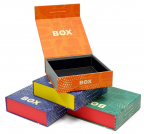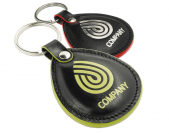RFID / NFC
NFC (Near Field Communication)
NFC is a short-range wireless communication technology that allows data exchange between devices in very close proximity (up to 10 cm). It operates at a frequency of 13.56 MHz and is an extension of RFID technology.
Characteristics of NFC:
- Bidirectional communication – allows for both sending and receiving data between two devices.
- Short range – devices must be close to each other.
- Security – the short range reduces the risk of data interception.
- Power supply – can work passively (e.g., NFC stickers powered by the reader).
Applications of NFC:
- Contactless payments – e.g., Google Pay, Apple Pay.
- Electronic tickets – public transportation, mass events.
- Device pairing – quick connection of devices (e.g., Bluetooth speakers).
- User identification – access cards and ID badges.
- Automation – programming smartphones using NFC tags.
RFID (Radio Frequency Identification)
RFID is a technology that uses radio waves to identify objects or individuals through special RFID tags and readers. RFID can operate at various distances – from a few centimeters to several meters, depending on the frequency and type of tag.
Characteristics of RFID:
- Unidirectional communication – the reader retrieves data stored on the RFID tag.
- Varied ranges – from a few centimeters (LF and HF tags) to several meters (UHF tags).
- Active and passive tags – active tags have their own power source, while passive tags are powered by the reader.
Applications of RFID:
- Logistics and warehousing – tracking goods and managing inventory.
- Animal identification – RFID chips implanted in animals.
- Access control – RFID cards used in entry control systems.
- Production management – monitoring production processes.
- Payment systems – e.g., toll systems (viaTOLL).
SUMMARY OF DIFFERENCES
RFID (Radio Frequency Identification) and NFC (Near Field Communication) are wireless radio communication technologies, but they differ in several key aspects:
-
Range of Operation
- RFID: Can operate over longer distances, depending on the frequency. The range can vary from a few centimeters to several meters.
- NFC: Works at a very short distance, typically up to 10 cm, which increases communication security.
-
Type of Communication
- RFID: It is a unidirectional technology, usually functioning by reading data from a tag using a reader.
- NFC: Allows bidirectional communication, enabling data exchange between devices (e.g., smartphones).
-
Operating Frequency
- RFID: Operates across three frequency ranges:
- LF (125–134 kHz): Short range, e.g., for animal identification.
- HF (13.56 MHz): Used in contactless cards.
- UHF (860–960 MHz): Longer range, e.g., in logistics.
- NFC: Operates exclusively at 13.56 MHz, which is within the HF range.
- RFID: Operates across three frequency ranges:
-
Applications
- RFID: Primarily used in logistics, warehouses, inventory identification, and inventory management.
- NFC: Widely used for contactless payments, personal identification, electronic tickets, and data exchange between mobile devices.
-
Power and Energy Source
- RFID: Tags can be passive (no power source) or active (with a built-in battery).
- NFC: Always uses passive tags powered by the electromagnetic field generated by the reader.
-
Security
- RFID: Due to its longer range and simpler architecture, RFID is more vulnerable to signal interception and attacks.
- NFC: The short range and additional mechanisms, such as encryption, make NFC more secure for applications requiring data protection (e.g., payments).
Conclusion
- RFID is better suited for systems requiring long-range operation, such as logistics or mass identification.
- NFC is ideal for applications requiring close interaction, security, and bidirectional communication, such as payments and electronic tickets.
-
 NFC stickerNFC stickerSee more
NFC stickerNFC stickerSee more -
 NFC Epoxy TagsNFC Epoxy TagsSee more
NFC Epoxy TagsNFC Epoxy TagsSee more -
 Silicone wristbands with RFIDSilicone wristbands with RFIDSee more
Silicone wristbands with RFIDSilicone wristbands with RFIDSee more -
 PVC wristbands with RFIDPVC wristbands with RFIDSee more
PVC wristbands with RFIDPVC wristbands with RFIDSee more -
 Nylon wristband with RFIDNylon wristband with RFIDSee more
Nylon wristband with RFIDNylon wristband with RFIDSee more -
 NFC textile wristbandNFC textile wristbandSee more
NFC textile wristbandNFC textile wristbandSee more -
 Elastic Polyester Wristband with RFIDElastic Polyester Wristband with RFIDSee more
Elastic Polyester Wristband with RFIDElastic Polyester Wristband with RFIDSee more
































